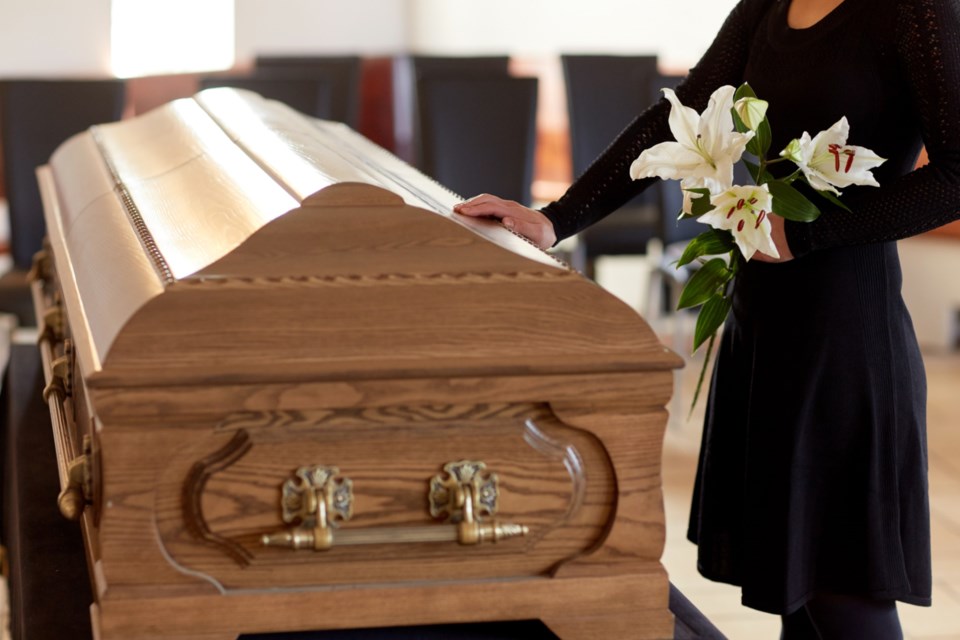This article by Kathy Kortes-Miller, Lakehead University and Tara Lewis, Lakehead University originally appeared on the Conversation and is published here with permission.
Have you found yourself reading more obituaries since COVID-19 began? You’re not alone.
The pandemic safety measures and restrictions have changed the way people engage in social mourning. Traditional funerals and memorials have pivoted to consider alternate ways of connecting, and storytelling and memory-sharing have taken on new forms.
No natural disaster, no stay-at-home order and no pandemic can stop people’s need to acknowledge death and offer support to one another. A solution that helped people abide by the rules while also fulfilling their need to grieve with others has been the COVID-19 era obituary.
Unlike obituaries from previous years, some written during the pandemic seem to have taken on new life, so to speak, with newer levels of openness. Obits composed during isolation and restrictive times often offer more descriptive, longer and sometimes intimate stories of those who have died. Meanwhile, some are short and to the point with a strong political leaning.
People are crafting obituaries that are deeply creative, funny and even quirky as they strive to capture the person, their significant relationships and life events. And these very personal obituaries have a larger reach now thanks to social media. Obituaries have grown into sources of public health information bookended by beautiful stories and meaningful memories as people navigate grief.
Over six million grieving
Many people are aware of the increased number of deaths and how COVID-19 restrictions challenged people’s need to grieve — they had to get creative. People began streaming funerals online, creating YouTube videos of funerals and holding drive-thru funerals.
The Canadian Grief Alliance has a COVID-19 “grief counter” keeping track of the number of people actively grieving the death of someone during the pandemic — that number is currently at 6,238,962. The number is even higher in the U.S. where there have been over one million COVID-19 related deaths.
Because of this, the pandemic has made people more comfortable when it comes to talking about grief. And obituaries are seen as a safer, less judgmental space for people to share stories about the lives and the deaths of the ones they loved — including whether they have died of COVID-19. Some boldly written obits included the cause of death and eloquently called politicans and others to task.
Growth of obituaries
Before COVID-19 we attended funerals where people were eulogized with jokes, performances and tears, often all at the same time. And because of the pandemic, eulogies became obituaries and the performative nature translated well into print.
When Michael de Adder’s mother Margaret passed away in January 2021, he wrote a “hilariously honest” obituary that went viral. In it he described his mother as a “professional clipper of coupons, baker of cookies, terror behind the wheel, champion of the underdog, ruthless card player and self-described Queen Bitch.”
In an interview with Next Avenue de Adder said: “My mother wanted an Irish wake, I couldn’t give her that due to COVID-19, but I gave her an Irish wake in an obituary.”
And making the most out of the printed obituary has become an essential practice during the pandemic. An obituary for Renay Mandel Corren described her as “a plus-sized Jewish lady redneck” who was great at “dyeing her red roots, weekly manicures, dirty jokes, pier fishing, rolling joints and buying dirty magazines.”
Funeral directors also chimed in on the growth of obituaries saying “people are looking for an outlet to tell the life story. They can’t do it for the masses with their bums in the seats.”
Keep writing obituaries
An obituary works to include meaningful parts of a person’s life and while obituaries have been on the decline in recent years, the pandemic saw families come together to write.
This new collaboration may also reflect a focus on family and community that has been revealed by the pandemic as people looked for the positive during challenging times.
In an interview with CBC News, Rev. Anthony Bailey of Parkdale United Church in Ottawa said, “a tremendous capacity emerges in the family circle when this [collaboration] happens… how can we, in a lyrical way, in a literary way, portray this life?”
COVID-19 has brought a new collective focus onto people’s lives, deaths and our grief. It has challenged people to look more closely at the roles of grief rituals, including obituaries.
Margalit Fox, former senior obituary writer at the New York Times said in the documentary film Obit that, “obits have next to nothing to do with death and, in fact, absolutely everything to do with life.”
The pandemic has forced people to discover new ways of maintaining connection with one another and to consider their own mortality — obituaries played a part in making this easier. So, keep connecting, keep reading and keep writing obituaries.![]()
Kathy Kortes-Miller, Associate Professor, School of Social Work, Lakehead University and Tara Lewis, Master of Social Work Student, Lakehead University
This article is republished from The Conversation under a Creative Commons license. Read the original article.



